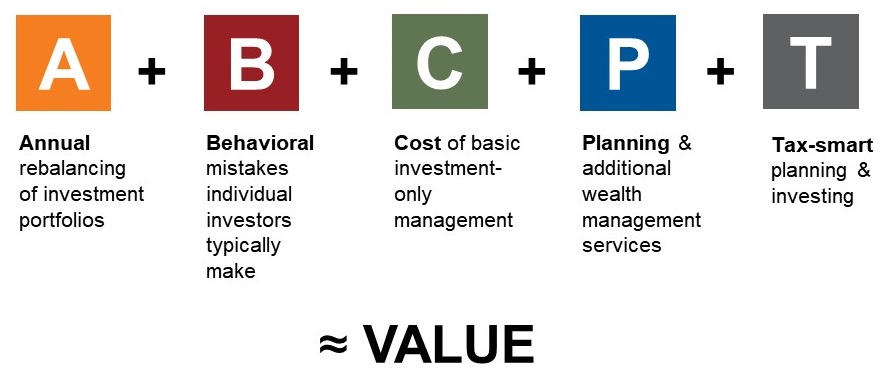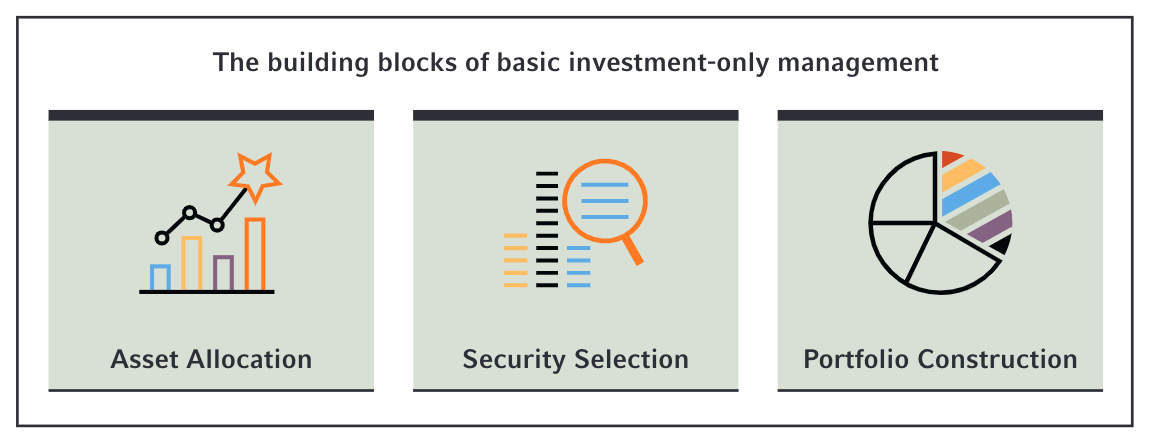Look beyond investment management to justify your cost
What are an advisor’s investment management skills worth? Enough to justify their fees?
Let’s be clear: We believe in the value of advisors. We believe the skills and hard work they bring can more than justify their typical fees. But if they focus their value primarily on investment management, we think that’s a mistake.
Think about it this way: who else is offering investment management to investors? Robo-advisors. Many deliver investment-only management, without a financial plan, ongoing service, or guidance. They provide statements, online access and a 1-800 number to call in case of questions. You can’t get much more bare-bones than that. It’s a helpful solution for some investors—but are those the types of clients you’re seeking?
Click image to enlarge
Here’s the problem: A lot of advisors have historically anchored their value on investment management—on the skills they bring around asset allocation, security selection and portfolio construction. But, as we just shared, robos do this, too—and typically for a much lower (and on average declining) fee. Is anchoring your value on one part of your service model that risks becoming commoditized and is experiencing pricing pressure really the best long-term strategic decision for your business? It will be hard to justify a 1% fee for something an investor can get elsewhere for much less in many cases.
The tangible vs. the intangible
Here’s the other issue with advisors basing their value on investment management: All that work happens behind the scenes. Clients never sit at the side of an advisor while he or she is building a portfolio. The work becomes intangible. Even if an advisor is building portfolios by hand, one security at a time (which we advise against, by the way), the client is not there to witness the work and likely assumes it’s partly or wholly automated.
Click image to enlarge
We believe the services that are most valuable to your clients are the ones advisors do while working together with their clients, such as building plans and managing investor behavior. It’s the face-to-face interactions that provide the most tangible value.
If you are still doing investment management the old-fashioned way for all of your clients, take a step back and re-evaluate your priorities and the long-term drivers of your business growth. Consider working with someone like Russell Investments for at least a portion of your client base to free up your time to do more of the work where investors attach the most value and where you can have the most unique impact—managing their behavior, planning and solving their tax issues.
The human factor
This year, our market had a major identity crisis, flip-flopping from bull to bear and back to bull again in a matter of months. In my experience, when the stakes are this high, humans want to work with humans—not robots. Why? Because even if a robo-advisor is skilled at security selection, it’s not skilled at talking to investors and preventing them from selling out and going to cash at precisely the wrong time.
We all saw the market moves this spring. And in my last blog post, we showed how so many investors still tend to follow the herd, buying high and selling low. Imagine that an investor was alone at home in March or April of this year, watching the value of their portfolio plummet due to pandemic mayhem. If they were thinking of pulling out of the market (and then missing an historic bounce), who would be most likely to talk them out of it? A pre-programmed set of app messages? An automated answering system? Or a human, who they’ve sat down with, built trust with, planned together and shared family stories with? I believe that’s one of the key areas where advisors beat robos. And I believe that’s where advisors add the most value.
Robos have learned from us. What can we learn from them?
Don’t fear technology. Lean into it. We know that robos have learned about investment management by trying to replicate what humans have done. So now it’s our turn. Here are four areas where human advisors can borrow from robo-approaches:
- Communication methods – Even before the quarantine requirements that come with our current pandemic, digital communication has been growing. Now, more than ever, technology has become a primary communication vehicle—you had better get skilled at virtual meetings. Don’t assume you know how your clients prefer to be communicated with. Ask them: Do you prefer communication via phone, email, text, video chat, or in-person? You may be surprised at their answers.
- Time management – Technology can also help you prioritize your time, so that you, the human advisor, are focused on the highest value deliverables. Which internal processes within your practice can be automated? I know many advisors have started down that path, but you can likely do more. How are you using technology to automate low-value tasks and shift your and your team’s saved minutes to more client-facing time?
- Online presence – Do you have an online presence and social media support that drives your brand? Don’t just think in terms of your website. Think of your total online presence—including social media channels—as your 24/7 team member that plays an increasingly large part with prospects that perhaps you’ve never even met. If these prospects can get a good feel for what you offer—including not just your expertise and your services, but also your personality and the personality of your team—then these prospects have a higher likelihood of making a valuable connection. Ask your Russell Investments representative for tips on this timely topic.
- Inventory strategy – Finally, how can you leverage technology to support your inventory strategies and the customer experience of your existing clients? This is another place where technology can be used to shift time to more client-facing tasks.
The bottom line
In the formula of advisor value, C is for the cost of basic investment-only management. This basic service is both worthwhile and necessary. But it’s only one small part of an advisor’s value. So, as we encourage advisors to lean into technology, we also encourage them to focus on the more human factors of their offerings.
To learn more about the 2020 Value of an Advisor Study, click here.

